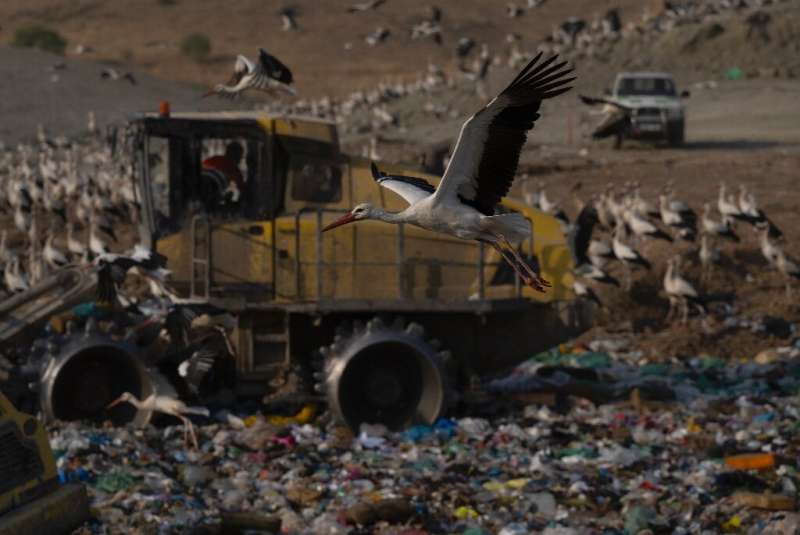A growing number of white storks have given up migration to Africa and live in Spain all year round.
In a sprawling landfill near Madrid, hundreds of white storks dodge garbage trucks as they search for food scraps among the mountains with multicolored garbage bags.
The long-legged birds have traditionally flown from all over Europe to African meadows for the winter and have returned in the spring.
But the abundant food found in landfills, coupled with the warmer weather, is causing more and more storks to skip this arduous journey and stay in Spain for the winter.
“For us, they’re part of the landscape,” said Carlos Pinto, a sanitation worker at a landfill site in Pinto, some 30 kilometers (18 miles) south of Madrid.
The landfill receives between 200 tons and 300 tons of food waste per day, and the storks immediately go to the zones “where there is fresh waste,” he added.
The scene is repeated throughout Spain, with many storks choosing to nest near landfills where they live year-round.
In Alcala de Henares, the birthplace of Miguel de Cervantes, the author of Don Quixote, near Madrid, white storks have become a symbol of the city because they have become so numerous.
“Wherever you look, there are storks,” says Almudena Soriano, the city’s veterinarian.
Stork’s nests crown Alcala’s bell towers, and the rattling sound they make with their long beaks can be heard throughout the city.
In 1970 there were only ten stork nests in the city. A census conducted in 2021 found 109 nests — a more than tenfold increase — harboring up to 300 storks.
In Alcala de Henares near Madrid, white storks have become a symbol of the city because they have become so numerous.
Garbage ‘buffet’
Soriano estimates that “about 70 percent of storks no longer migrate” to Africa, mainly because of the readily available food they can find in landfills in Spain.
This allows them to avoid the dangerous crossing of the Strait of Gibraltar that separates Spain from Morocco, which measures just 14 kilometers (nine miles) but is often ravaged by high winds.
“Many die along the way. The adult storks that have already made the journey do not want to repeat the experience,” Soriano said.
“And since they move to find food, an open dump is an all-you-can-eat buffet for them. There’s no need to leave anymore.”
A 2020 census by SEO Birdlife found 36,217 white storks in Spain.
Spain used to be just a stop on the birds’ annual migration to Africa, but now a significant number of white storks spend the winter in the country, the NGO said.
The population of white storks in Spain has steadily increased in recent decades.
This includes storks born in Spain, as well as storks originating from European countries further north, such as Denmark, Germany and the Netherlands.
Some storks return to Northern Europe after the winter, while others remain permanently in Spain.
Young storks still have the instinct to migrate to Africa, but they make the journey without their parents, says ornithologist Blas Molina of SEO Birdlife.
Climate change
While the ready availability of food in landfills is the main reason storks have stopped migrating, it is also “probably due to the tendency towards higher temperatures” caused by climate change, the NGO said in a recent report.
Adult storks remain “a little further north” in the Iberian Peninsula, having previously stopped in the southeastern region of Extremadura and Andalusia to the south, Molina said.
The change in stork’s migratory habits is a clear example of the “effects of human activity on biodiversity,” he added.
The municipality of Pinto is considering sealing its landfill to prevent storks from swallowing plastic and other potentially harmful objects.
The municipality of Pinto is considering sealing its landfill to prevent storks from swallowing plastic and other potentially harmful objects. If so, the storks can leave.
Alcala closed its landfill last year, but set up giant feeding stations to ensure the storks had enough to eat and stay in the city.
The scheme appears to be working as stork populations in the city have remained stable.
White storks have been found to alter migration patterns due to changes in the human environment
© 2022 AFP
Quote: Storks stop migrating to live in a landfill in Spain (2022, July 22) retrieved on July 22, 2022 from https://phys.org/news/2022-07-storks-migrating-landfill-spain.html
This document is copyrighted. Other than fair dealing for personal study or research, nothing may be reproduced without written permission. The content is provided for informational purposes only.

